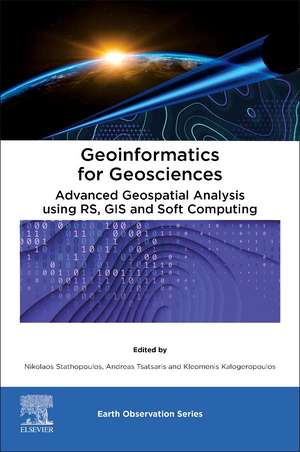Geoinformatics for Geosciences: Advanced Geospatial Analysis using RS, GIS and Soft Computing: Earth Observation
Editat de Nikolaos Stathopoulos, Andreas Tsatsaris, Kleomenis Kalogeropoulosen Limba Engleză Paperback – 12 iun 2023
Detailing up-to-date techniques in geoinformatics, this book offers in-depth, up-to-date methodologies for researchers and academics to understand how contemporary data can be combined with innovative techniques and tools in order to address challenges in the geosciences.
- Focuses on a variety of interdisciplinary applications using Earth observation data, GIS, and soft computing techniques to address various challenges in the geosciences
- Presents both innovative techniques and specific features of the practices described, thus allowing readers to choose the most appropriate method to apply to their specific problems
- Comprehensively details the state-of-the-art methodologies and decision-making tools included to ensure they are easily reproduceable
Preț: 827.96 lei
Preț vechi: 1083.27 lei
-24% Nou
Puncte Express: 1242
Preț estimativ în valută:
158.44€ • 169.42$ • 132.10£
158.44€ • 169.42$ • 132.10£
Carte tipărită la comandă
Livrare economică 10-24 aprilie
Livrare express 13-19 martie pentru 98.18 lei
Preluare comenzi: 021 569.72.76
Specificații
ISBN-13: 9780323989831
ISBN-10: 0323989837
Pagini: 404
Dimensiuni: 152 x 229 x 22 mm
Greutate: 0.65 kg
Editura: ELSEVIER SCIENCE
Seria Earth Observation
ISBN-10: 0323989837
Pagini: 404
Dimensiuni: 152 x 229 x 22 mm
Greutate: 0.65 kg
Editura: ELSEVIER SCIENCE
Seria Earth Observation
Cuprins
1. Geoinformatics, spatial epidemiology, and public health
2. Quality of life in Athens, Greece, using geonformatics
3. A new kind of GeoInformatics built on living structure and on the organic view of space
4. Geospatial modeling of invasive Aedes vectors in Europe and the diseases they transmit: a review of best practices
5. Deposition and erosion dynamics in Axios and Aliakmonas river deltas (Greece) with the use of Google Earth Engine and geospatial analysis tools
6. Crowdsourced geospatial data in human and Earth observations: opportunities and challenges
7. Google Earth Engine and machine learning classifiers for obtaining burnt area cartography: a case study from a Mediterranean setting
8. On volunteered geographic information quality: a framework for sharing data quality information
9. Natural disaster monitoring using ICEYE SAR data
10. Oil spill detection using optical remote sensing images and machine learning approaches (case study: Persian Gulf)
11. Remote sensing and geospatial analysis
12. Mineral exploration using multispectral and hyperspectral remote sensing data
13. Geographic information systems and remote sensing for local development. Reservoirs positioning
14. An integrated approach for a flood impact assessment on land uses/cover based on synthetic aperture radar images and spatial analytics. The case of an extreme event in Sperchios River Basin, Greece
15. Quantitative comparison of geostatistical analysis of interpolation techniques and semiveriogram spatial dependency parameters for soil atrazine contamination attribute
16. Comparison of “subjectivity and “objectivity in expert-based landslide susceptibility modeling
17. Remote sensing and geographic information system for soil analysis—vulnerability mapping and assessment
18. Multiparameter analysis of the flood of November 15, 2017 in west Attica using satellite remote sensing
Conclusions
Index
2. Quality of life in Athens, Greece, using geonformatics
3. A new kind of GeoInformatics built on living structure and on the organic view of space
4. Geospatial modeling of invasive Aedes vectors in Europe and the diseases they transmit: a review of best practices
5. Deposition and erosion dynamics in Axios and Aliakmonas river deltas (Greece) with the use of Google Earth Engine and geospatial analysis tools
6. Crowdsourced geospatial data in human and Earth observations: opportunities and challenges
7. Google Earth Engine and machine learning classifiers for obtaining burnt area cartography: a case study from a Mediterranean setting
8. On volunteered geographic information quality: a framework for sharing data quality information
9. Natural disaster monitoring using ICEYE SAR data
10. Oil spill detection using optical remote sensing images and machine learning approaches (case study: Persian Gulf)
11. Remote sensing and geospatial analysis
12. Mineral exploration using multispectral and hyperspectral remote sensing data
13. Geographic information systems and remote sensing for local development. Reservoirs positioning
14. An integrated approach for a flood impact assessment on land uses/cover based on synthetic aperture radar images and spatial analytics. The case of an extreme event in Sperchios River Basin, Greece
15. Quantitative comparison of geostatistical analysis of interpolation techniques and semiveriogram spatial dependency parameters for soil atrazine contamination attribute
16. Comparison of “subjectivity and “objectivity in expert-based landslide susceptibility modeling
17. Remote sensing and geographic information system for soil analysis—vulnerability mapping and assessment
18. Multiparameter analysis of the flood of November 15, 2017 in west Attica using satellite remote sensing
Conclusions
Index














